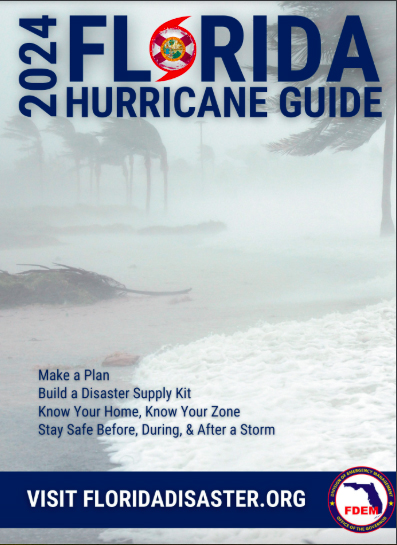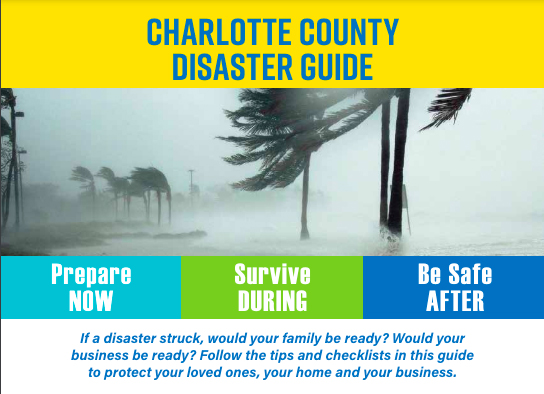Disaster Preparedness
Unfortunately, not participating in hurricane season isn’t an option. Whether or not we like it, hurricane season comes every year. And due to living in Florida and climate change, our community will continue to experience an increase in storms, strange weather, hotter seasons, tornados, and hurricanes. It is vitally important to be prepared for the hurricane season that is approaching us. Below is a list of resources to help stay in the know of what is happening and how to receive help. In addition, know that we are here for you. If you need anything, please reach out to Wendy by clicking HERE.
In general we are all advised to do now – not when the storm is upon us:
Read and consider the follow preparedness guides:
- Have a realistic understanding of your risk for wind, flood, surge, tornados, and rip currents.
- Sign up with riskfactor.com to know your risks.
Have an evacuation plan:
- Know how to find out if you are recommended to evacuate
- Plan your route(s) – with more than one option
- Share your plan with Pastor Devon or church elder and relatives outside the area
- Don’t wait until it’s too late, leave when ordered or better yet, before,
- Make a plan for your fur babies. Here is one option, but the primary goal is to think through your animal situation and make a plan ahead of time.
http://FloridaDisaster.org/PlanPrepare/Pets
Mitigate risks and strengthen our homes
- Keep trees trimmed away from your homes before the storm
- Have storm shutters or materials to cover windows ready. Reach out if you need help hanging them.
- Have a plan to get loose things inside. If someone can carry it, you should have a plan on where it goes and how you’ll get it inside.
- Be able to get your car in the garage. Don’t wait until just before the storm, get it cleaned up and ready now!
- Be able to secure all your doors
Prepare an emergency kit. There’s lots of resources on what to put in it, ask us if you need more information.
Consider special needs of your family:
- Any one who has special needs, will need additional planning. There are resources for that, such as this one from Red Cross, or FEMA or this one Florida Health. They have But others exist and so if this sounds like you or someone in your family, plan for those additional needs as well.
Keep our insurance up-to-date
- Check your policy and know ahead of time what is and is not covered.
- Ask specific questions about flood, wind
- Visit United Policyholders, they are a nonprofit dedicated to being a trustworthy and useful information resource and an effective voice for consumers of all types of insurance.
- Visit floodsmart.gov and learn about your risk and insurance options.
- Know how to prepare your home and car according to what your insurance requires so they are covered.
- Know where the insurance information is and be ready to put it in plastic and to take it and other important documents with you if you evacuate.
Stay informed.
God forbid, we have another storm, it’s vital you stay informed. Plan now where you want to get hurricane info before and during a storm.
Here are some resources we recommend considering.
- Alerts – every community has an emergency alert system with alerts that come to your phone. Please sign up for these. One way to do that is to text your zip code to 888777 and you will get to the alerts for your area! It works – try it! You can do it for multiple zip codes if that is helpful to you. (Snowbirds for example might want multiple alert areas to consider. This is not just for hurricanes. In each case, you’ll want to go to the city or county websites closest to you and sign up for those as well either through their websites or through 888777.)
- In addition to texting 888777, here are the sites you should use for local alerts. Here in Port Charlotte we have Alert Charlotte, Alert Punta
- Gorda, and for North Port, etc. there is Alert Sarasota County,
- Social media – follow trusted sites, local, state, and national websites like NOAA, Ready.gov, Florida Division of Emergency Management, Charlotte County Emergency Management, weather.govand whatever local media you trust.
This is also a great way to stay in touch with loved ones. - Computer – bookmark local, state,and national websites like those we’ve listed below. Additionally, non-governmental organizations (NGO’s) like Presbyterian Disaster Assistance (PDA), SBP and the Red Cross also have preparedness information.
- There are also phone apps that might be helpful, including a hurricane tracker app, those from FEMA, Red Cross, etc.
- TV – whatever local channel you trust.
- Radio – listen to NOAA weather radio
We are not experts in preparedness, but we are convinced that following the instructions of hurricane experts is wise advice. Because of this we offer a few important organizations for you to pay attention to. Go to their websites and follow them on social media. Each of these sites provide helpful information on one or all of the 5 general steps above.
Preparedness Resources websites to bookmark. Be sure to also follow them each on whatever social media that you use. And be sure to have national, state, and local government in the list that you bookmark and follow on social media.
- National: National Hurricane Center, NOAA, Ready.gov, National Weather Service, CDC, Emergency preparedness for older adults, OSHA, Department of Defense
- Non-Governmental Organizations: Red Cross, SBP, Convoy of Hope,
- Florida: Florida Disaster, Florida Health Preparedness
- Local: Charlotte Emergency Management, Sarasota County Emergency Management, Alert Punta Gorda, Alert Charlotte, Alert Sarasota County
- There are others, but these should give you lots of information so that you can decide what are the best options for your family



